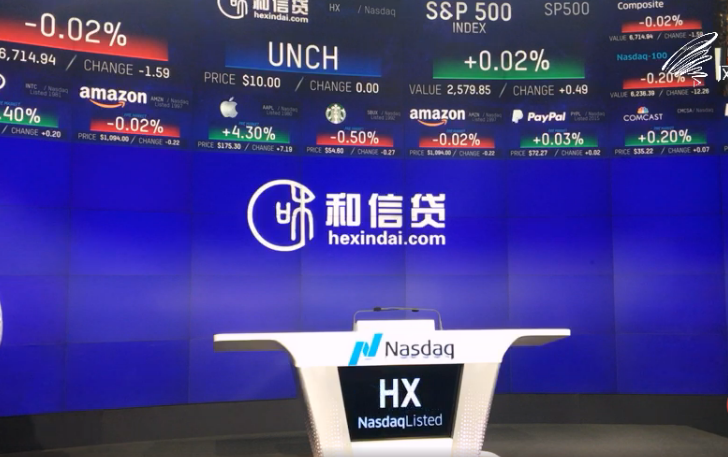Bottom line: The wave of strong sentiment for new offshore IPOs by Chinese companies is running out of steam, but listings before year-end could still get a slight left, especially fintechs.
-

- Hexindai jumps on trading debut
Fintech is hot, and just about everything else is not. That appears to be the message with the latest offshore IPO by a Chinese firm, this time from Hexindai (Nasdaq: HX), a peer-to-peer (P2P) lender that takes in money from small investors and then lends it out to borrowers. Hexindai's shares initially soared as much as 70 percent in their trading debut before finishing a much more modest but still comfortable 20 percent higher.
We'll review the latest offshore IPO by a Chinese company in more detail briefly, but I thought this would also be a good opportunity to do a scorecard for a broader flurry of deals that has hit the market in the last month or two to see how they're doing. The bottom line seems to be quite clear: IPOs from this new generation of financial technology companies, or fintech, are generally doing ok, while just about everyone else is now below their IPO prices.
It's also worth noting that even the euphoria towards the fintechs seems to be rapidly fading, as evidenced by Hexindai's original pop in its trading debut before the stock settled down to much lower levels. The company made a relatively modest offering that raised $80 million. The American Depositary Shares (ADSs) priced at $10 apiece, which is right in the middle of their previously announced range of $9-$11.
The company has facilitated 9.7 billion yuan ($1.5 billion) in loans to more than 56,000 borrowers to date, and has a bad loan ratio of more than 2.6 percent, according to its prospectus. (English article) It's important to note that the company is using the word "facilitate" in describing its lending activity, since such P2P lenders technically aren't allowed to make loans. The 2.6 percent bad-loan ratio looks a little high, though apparently investors weren't too worried about that.
As I've said above, the stock initially jumped as much as 70 percent when trading began on Friday, before finally pulling back quite a bit to close at $12.25, or 22 percent above the offer price. That's probably quite representative of this fintech group, which looks exciting in theory as it represents the first real private-sector activity in China financial services market, which until 4 or 5 years ago was mostly monopolized by slow-moving state-owned banks.
But the reality is that these fintechs are very much neophytes at these kinds of services, and have mostly experienced their explosive growth on the back of China's fast-growing economy. I, and probably most other people, have serious doubts about their ability to handle a downturn of any sort, which is almost what China is certain to encounter over the next couple of years. That inability could see their bad loan ratios explode if and when such a downturn comes.
Treading Water
Out of about a half-dozen large offshore IPOs by Chinese companies over the last two months, the fintechs, which make up half the group, are just about the only ones that are still above their offer prices. The much larger Qudian (NYSE: QD), which originates small consumer loans via online channels, originally surged after its $900 million offer, before gyrating wildly after its CEO made some slightly tempestuous remarks, briefly trading below its IPO price.
The stock has come back somewhat since then, as the company's management team sought to calm markets about its bad-loan policies and ratios, and is now a modest 4 percent above its IPO price. The only other fintech in the group, online insurance provider ZhongAn (HKEx: 6060) is doing the best in the group, now about 30 percent ahead of its offering price. But it's worth noting the stock was ahead by nearly twice that amount at one point, and has been moving steadily downward recently.
After those three companies, two of the other three that have made relatively big IPOs in this latest wave are under water at this point. The only one above water is Alibaba-backed (NYSE: BABA) logistics services provider Best Inc (NYSE: BSTI), whose shares now trade about 12 percent above their IPO price. The stock has stayed above its IPO price since its September debut, but has mostly bounced around in a 10-20 percent range above the offer price, most likely on the "Alibaba effect."
The other two companies, luxury e-commerce site Secoo (Nasdaq: SECO) and education services provider Rise (Nasdaq: REDU) are both off of their IPO prices by 38 percent and 8 percent, respectively. I doubt there's anything majorly wrong with either of these companies, and both are probably mostly suffering from the "been there, done that" syndrome, as there are already other choices from their categories to invest in.
At the end of the day, the earlier euphoria over the fintechs does seem to be fading fast, and appetite for non-fintechs even faster. Still, offerings that make it to market by year-end could still get a slight lift.
0
推荐




 京公网安备 11010502034662号
京公网安备 11010502034662号 